#i would die for elspeth EASILY
Text
Just had a totally depressing, but potentially accurate, thought while I was making my tea...
What if the reason Crowley doesn't have any friends outside of Azi, and seems to expend so much energy deliberately not remembering people's names or faces is because he's tired of losing friends?
Hear me out...
Aside from Azi, who's been a large part of his life since even before Eden, Crowley doesn't make many close, personal connections. I think that may be a choice, and not the "oh, I'm a big, bad demon" type of choice either... A real fear of letting people get close to him for fear of losing them.
In the minisodes that predate Golgotha, we see a different Crowley. He knows who Shem is, at the Ark, indicating that he might have been friendly with at least one of Noah's sons. As Bildad the Shuite, he not only addressed both Job and Citis by name, but he also referred to Ennon with "he seems nice" and told Jemima "you haven't annoyed me yet" and seemed particularly impressed with Job's younger daughter.
Then Golgotha rolls around, and we encounter a much more somber Crowley, who's so suspicious of Heaven suddenly that he can't even trust Azi to not be there "to gloat." Crowley's hurting. He's watching Romans -- through Heaven's machinations -- kill his closest human friend.
Eight years later, in Rome, Crowley is bitter, and snarky, and easily annoyed. He lashes out at Azi (yes, it was a dumb question, but he'd never lashed out directly at Azi like that, before).
Skip a few hundred years (during which there seems to be no indication he's tried to make friends with anyone except Azi). Edinburgh. Crowley slips up, lets himself care enough about Elspeth and wee Moraig to refer to them by name, and even joke around a bit with Elspeth, at Azi's expense. Then, wee Moraig is killed, and Elspeth tries to take her own life. I maintain that the idea of watching someone else he's come to care about DELIBERATELY take their own life rattled Crowley more than the Laudanum alone. And he realized one way or another, Elspeth would eventually die, so he set out to get her on the "properly good" path, so he could be sure she didn't go to Hell whenever she might die.
But I think the incident with wee Moraig and Elspeth was the end, for Crowley. I think that's when he really started to develop his "alt names" for everyone he met. "Antichrist" (Adam... he only used his actual name I think once), "Book Girl" (Anathema. Admittedly, she never gave them her name, but Crowley never asked, either. Azi didn't either, but I think he was too wound up in the healing and the bike and all that to pay attention at the time)
He doesn't refer to any human by name, again, until Maggie and Nina. I think he kind of adopted them by proxy (Azi adopted them, so Crowley paid attention). But there was still a certain amount of distance, right up until the angels were threatening to turn Maggie and Nina into pillars of salt. Crowley immediately jumps in. These humans are friends, and he refuses to let Heaven or Hell hurt them.
Then AZI, of all people, gets (temporarily, I'm sure) removed from his life. It makes that final glance he gives the cafe and then the record shop, extra meaning. Without Azi, they've now become his only friends in the entire world. And he already knows how fragile human life is.
PS -- I did leave out one connection, with Leonardo da Vinci, whom we know from canon gave Crowley a sketch of the Mona Lisa signed "to my friend Anthony"... I did so deliberately, because while I have lots of headcanon regarding that friendship (get your mind out of the gutter... not THAT kind of headcanon), the truth is, we don't know enough of the REAL canon to know just how well they knew one another.
#my poor heart can't handle this#my poor little baby Crowley#good omens fandom#good omens#azicrow#aziracrow#ineffable husbands#aziraphale x crowley#ineffable spouses#crowley#good omens s2
45 notes
·
View notes
Text
The Resurrectionist minisode is easily my favorite of the three in s2.
Partially because the costuming is so good yeah, and silly David is silly, but mostly because it excellently demonstrates the very root of Aziraphale and Crowley's differences / disagreements.
It's also touched on in the zombie minisode where Zira sort of starts to question it (sort of) but the main root of their disagreements over heaven and hell is that Aziraphale only sees in black and white, and Crowley has a more nuanced view borne of experience and a bit of trauma (his 'shades of grey').
Aziraphale immediately labels Elspeth as 'wicked' because she digs up graves. This is an Evil activity, Aziraphale has decided, and therefor she's Evil, cut and dry.
Crowley asks 'is it wicked, though? she needed the money.' He can see that she's not necessarily a bad or evil person, she's just in a poor situation and hungry, starving, and wanting to keep herself and her partner alive. There's nuance to the situation that he tries to explain to Aziraphale and promptly gets brushed off / ignored.
Zira tries to change things so she doesn't dig up any more bodies, and it hurts her. He still thinks he's done well until he talks to the surgeon and realizes what he's trying to do is 'good' - learn about anatomy and help people, cure people. stop little seven year olds from dying of tumors.
Aziraphale then decides that digging up graves is Good Actually, because he's found a reason to label it so, but again it's a complete 180 that is only Black and White. It's good now! decreases human suffering. So do it all you like! Which isn't... correct either.
His meddling again hurts her and her friend, getting Morag killed, and if he hadn't done anything at all none of it would have happened. But things continue, and Aziraphale again stumbles when Elspeth suggests taking Morag to the surgeon, because suddenly that's different, even if it's for the greater good as he declared earlier, it still feels... wrong. Which again, Crowley points out! 'It's a little different when it's someone you know.'
Crowley just kind of goes along with all of Aziraphale's mistakes and points out the nuance, which continually and repeatedly goes over the angel's head. But he's trying SO HARD to let him learn it on his own.
At the end Crowley finally snaps, because he can't stand to watch this festival of errors any longer and watch any more humans die, so he snatches the laudanum and stops Elspeth from killing herself at great personal risk.
But the thing is, Aziraphale is STILL in this mindset in present day. 'Of course you said no to hell, you're the bad guys!' Crowley has only been trying to tell him for hundreds, thousands of years! Crowley gets it, understands the nuance, and Aziraphale doesn't. And Crowley finally got tired of being dragged along with it / Aziraphale wanted to drag him to the oneee place he isn't willing to go.
I dunno what it'll take for Aziraphale to learn, honestly. He's seen plenty... can't wait for season 3 to find out tbh.
26 notes
·
View notes
Text
Planeswalkers in Cube: White
It’s been a while since I’ve discussed cube, I think, and also a while since I’ve just dived into a stupidly long topic without thinking too hard about it. And so here we go.
Planeswalkers are kind of in an interesting place in Cubes. Most of the time, they’re powerful midrange or control threats, but a lot of them have more specialised roles that can make them better suited to particular cubes. They’re also popular to include, seeing as they’re big, cool, and splashy, and a lot of people really like playing with them. What home exists for something like Liliana, Death’s Majesty in any other format? (I know it’s fine in commander hush)
However, you can only afford so many slots for Walkers in your cube, depending on how you treat them. And so, you’re not going to see all of them very often. Here, we’re going to go through all of them, colour by colour, and figure out why you should or shouldn’t play them, and which go better in different builds. Starting off, as many things do, with Mono-White.
Some ground rules: I’m not going to talk about the Planeswalker deck cards in this post, because the answer to whether you should play them is pretty much universally “no, why”. I’m also not going to talk about the creature->planeswalker transform cards, because they get treated more like creatures in a Cube environment. Jace, Vryn’s Prodigy is kinda just Merfolk Looter.
My next point before I talk actual cards: I’m far from an expert on this sort of thing, and this is going to be my opinions! If you want a different perspective, Season 4 episode 6 of Solely Singleton is a great podcast about this exact topic, though it’s two and a half years old at this point so some things might be a bit outdated.
Finally: White is a colour that tends to get more good Planeswalkers than other colours. Turns out, most Gideons and token-producing walkers are good in slower decks, who’d a thunk it. So unlike, say, Black, the average here is a bit higher than most of the time.
Let’s get into it!
Ajani Goldmane

Ajani is kind of a classic, but the original iteration is kind of showing its 14 years of age. It’s a 4-mana walker (which is a very competitive slot) with a +1 that doesn’t really do anything, a turn-3 ultimate that dies to removal, and while the minus is good (see cards like Unbreakable Formation, or other Ajanis), it requires a board and isn’t really worth a four mana cast.
I had thought he’d be good in more budget lists, though. Except he hasn’t been printed since 2010 and so even though he sees no play he’s still like 5 bucks. So I’d pass on this version of cat dad.
Elspeth, Knight-Errant

On the other hand, Elspeth pt.1 is still one of the best Planeswalkers you can play. She makes blockers for days, can push through some serious damage, and does both of those things while getting more resilient rather than less. Her ultimate might not be game-breaking, but since she’s constantly pushing towards it anyway you don’t really mind. Also she’s only 4 mana, holy moly.
Elspeth is good in aggro, good in midrange, and arguably still more than playable in control. At 12ish dollars, it’s not the ideal price point, but if you can afford it (or have one sitting around), she’s absolutely worth the include.
Gideon Jura

Gideon 1 is a bit more specific. Aggro is not going to want him, seeing as the minus does basically nothing in that deck and the +2 isn’t really worth your time at 5 mana. On the other hand, this card is nuts in control. It’s a hard-to-kill wincon that is also removal that fuels its own condition and survives boardwipes. Gideon Jura is a chad in those decks, and kind of takes over the game the moment he comes down.
The other nice thing about Gideon Jura is that due to recent reprints in Mystery Booster and his Signature Spellbook, as well as not being very good in Commander, he’s ludicrously cheap. You can get one of these for under a dollar, making it perfect for budget cubes (that still include rares). Although, at that point, he might be warping to a cheaper format where aggro is worse, so keep an eye on him.
Elspeth Tirel

Elspeth’s second incarnation (which is the one with her last name, because ???) is significantly worse than her first. If you’re in a slower deck where you want the ultimate, she’s probably not going to live to make it there. If you want the tokens, there are better options at cheaper mana costs. And you don’t want the +2, unless you somehow have a decent board against a red aggro deck.
I remember really liking this card when I first started playing Magic. That was a long time ago, and we have had much better options in the near-decade since then.
Ajani, Caller of the Pride

The first 3-mana walker on this list, and one that shows the conservativeness WoTC had when first testing them at that mana cost. Just kidding, this came out after Liliana of the Veil.
Ajani 3is theoretically fine in an aggressive deck, but white has some seriously good 3-drop creatures that you’d rather just cast instead. Because when your options are a Blade Splicer or putting a +1/+1 counter on your two drop…I’m taking that token. And let’s not act like this card has any place in a midrange or control deck.
Gideon, Champion of Justice

This was the first Planeswalker I ever opened, so I have a soft spot for it. But not enough of one to put it in my cube.
As potentially threatening as this Gideon is, he basically doesn’t do anything? While token decks might have a hard time taking him out, seeing as his loyalty can get pretty huge against them, they can also just block him forever. The ultimate is a game-ender, but also would leave Gideon so small that your opponent might just have enough time to draw lands and get back in the game. And he doesn’t do anything to protect himself aside from get big, and doesn’t really progress your board, so. Sorry Gids, you’ll get them next time.
Elspeth, Sun’s Champion

Elspeths alternate being good, I guess. Elspeth, Sun’s Champion is basically unplayable outside of slow midrange or control, but is utterly incredible in those decks! She wipes out anything that would threaten her and makes enough blockers to easily protect either herself or you, and stalls long enough that those tokens can turn into a wincon via her ultimate.
It is not as universally powerful as the four-drop Elspeth, but the 6-drop one undeniably shapes the game when she hits the table. She stops aggro in its tracks, and nukes the shit out of midrange, especially green-based decks. I suppose there are times when she might be awkward to cast because she hits your own threats…but then just hold her back or +1, dude.
Ajani Steadfast

Ajani Steadfast is kind of trying to be a better version of Ajani Goldmane. And yet, funnily enough, the Vigilance on Goldmane’s -1 is so important, as is being a -1 instead of a -2, so he’s kind of in a similar tier. The loyalty counter upside is so utterly niche that it might as well not exist, but the +1 is unquestionably much better at least.
Like with Goldmane, Ajani Steadfast isn’t really doing anything at 4 that cheaper cards don’t do better. And he’s at about the same price point. At least the ultimate is better?
Nahiri, the Lithomancer

Nahiri is really specific. Like, if you’re at a power level where you have equipment worth playing Nahiri with, then you’re probably at a power level where she’s completely outclassed by things like Angel of Invention or…I mean, most other playable 5s. And some unplayable ones.
…I just remembered this card has 3 starting loyalty. On a 5-drop walker. You can -2 her and she’ll die to literally a goblin token. I sure hope that Equipment you got had Living Weapon!
Gideon, Ally of Zendikar
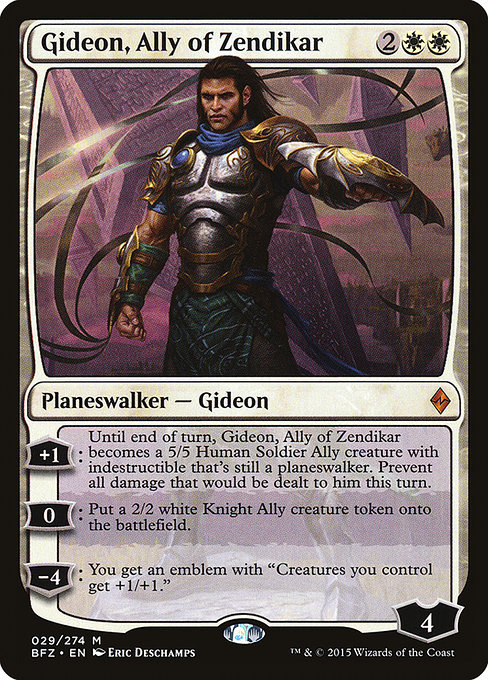
The first 4-drop that really steps to Elspeth, Knight-Errant. This Gideon is kind of just good in any deck- aggro decks like a 5/5 top end that makes a token T1 or just is an unkillable Glorious Anthem, midrange loves an infinite source of 2/2 to block or beat down with, and control loves an infinite source of blockers that can clean up after a wipe. He’s just kind of a disgusting piece of cardboard for a whole variety of decks, making him easily one of the best walkers in the entire format.
Also he’s…surprisingly cheap? After one “real” printing, and being on The List (which doesn’t do much, trust me), Gideon Ally of Zendikar is still only like 5 bucks. So if you can justify spending that much on one card…probably do that? He won’t let you down.
Gideon of the Trials
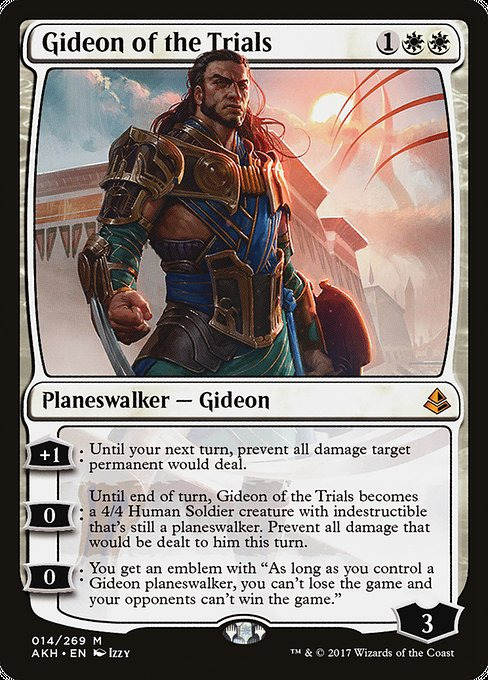
Unlike our first 3-mana walker, this one is more than playable in slower decks. Gideon of the Trials is kind of awkward for aggressive decks, put what he does do is effectively remove some seriously big threats, adjust for whichever is the biggest problem around, and still punches peoples as a 4/4 Gideon. And he also has the unique benefit of being a Planeswalker that makes combo decks think twice, given that Emblem- though you’ll still go to 0 life if Splinter Twin or a similar combo is in play, and then die since they probably killed him too there.
Once again, though, this card is pretty cheap, sitting at about 3 bucks. As we get towards the more recent end of this list, a lot of these cards are going to look like that. I remember when I made my first cube, with the restriction of “Rares/Mythics that are under $2 US”, and getting 0 white Planeswalkers. I was playing the Planeswalker deck Gideon, for fuck’s sake! Things are so much better now.
Ajani, Adversary of Tyrants
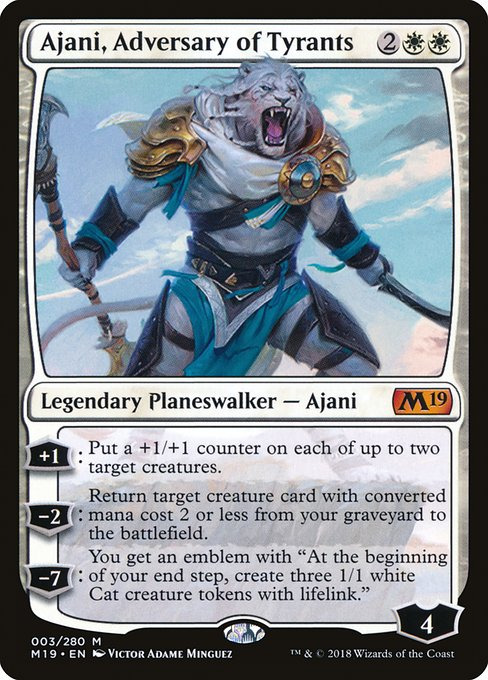
I could never really get a good read on this Ajani. It’s obviously something control doesn’t want, and the +1 isn’t doing a huge amount in midrange decks. But the -2 is powerful in creature-based decks, and the +1 is solid for quicker builds, but not enough to really justify 4 mana? There’s a lot of power here, but the parts kind of form a strange whole.
I guess it depends a lot on how deep that 2-drop slot is in your cube, and how deep the 4-drop slot is. Because you kinda need good 2s and medium 4s for Ajani to really shine. I’m a little bothered by how meh Ajanis are apparently in general in Cube, but the multicoloured ones are a bit more solid.
Gideon Blackblade
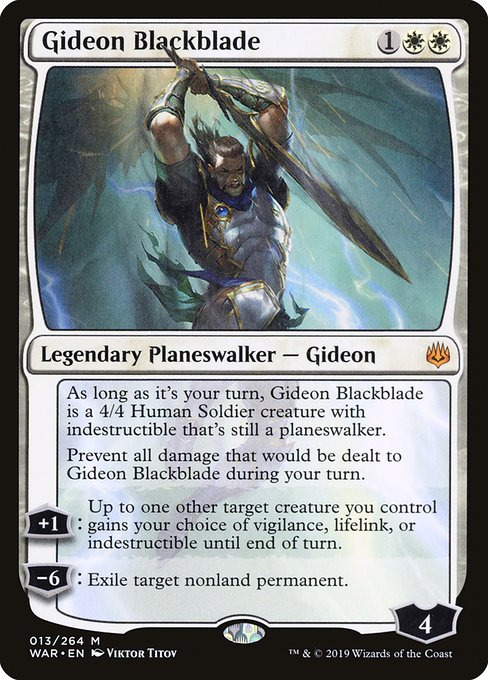
Take Gideon of the Trials, make it not playable in control, and make it really fucking good in aggressive decks. There you go, that’s Gideon Blackblade. Cheap in money and in mana, he’s here to die, aside from the part where he’s hard to kill.
The +1 on this card is not super great, but you have to keep in mind that you get that at the same time as Gideon being a creature. Honestly, it’s kind of easier to think of this card as a creature with a triggered ability than as a planeswalker, at least as far as cube is concerned. It also helps that the -6 isn’t actually that hard to hit, considering you can keep a creature back by giving it vigilance. He’s quite solid, and might just be the best aggro walker White gets. Certainly at 3, at least.
Teyo, the Shieldmage
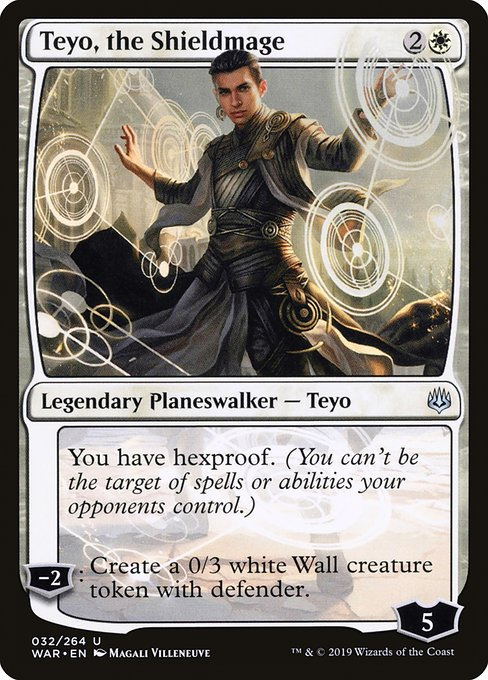
A bit of a step down from our last 3-drop, Teyo is clearly not built for the same formats as Gideon Blackblade. But with him, we can talk about weaker formats, like Peasant, where Teyo is…still not great? 3 mana gets you a pair of 0/3s and immunity to burn spells, which I suppose control might like in formats where you don’t really get board wipes, but I can’t imagine any other deck wanting him. And that’s not a great place to be.
The Wanderer
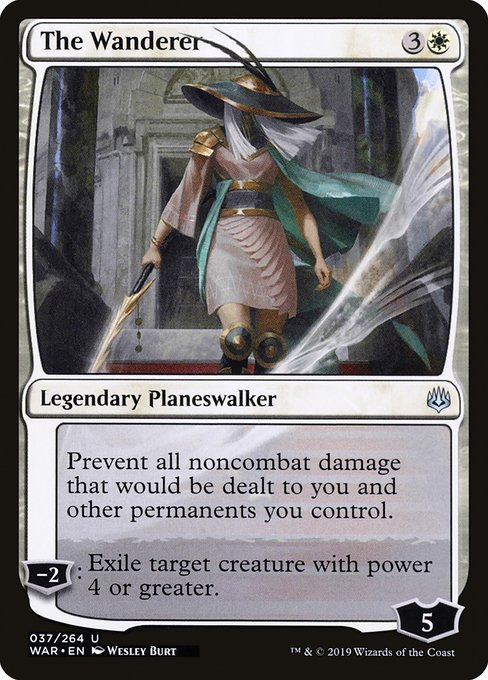
Much like Teyo, I don’t think even Peasant wants this. I do think it’s kinda better- their static abilities are virtually the same, except Mx. ??? here extends the burn protection to your creatures. And they do serve as removal, but its both expensive and narrow. Like, how often is this just going to kill a 4/4 and then get killed by their 2/2? I wouldn’t play Smite the Monstrous but it gains 2 life.
I’m interested to see this character return at some point. Maybe next time they can be playable. Some of the uncommon walkers from WAR were great for Peasant (and some even in higher formats), but this isn’t one of them.
Serra the Benevolent
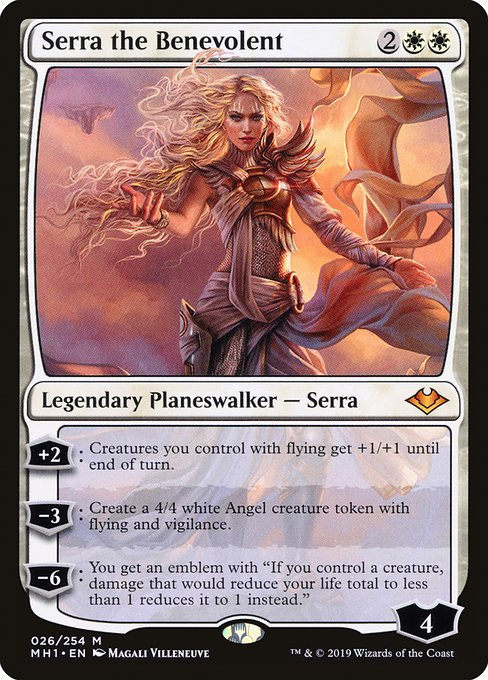
Okay, so. 4 mana Serra Angel that can stick around to make another one is quite powerful! Though the +2 basically does nothing, it’s still a +2, meaning you can get an unkillable Worship the turn after you play this if you aren’t under pressure, or go token into pump into token. Serra is clearly quite solid!
However, it suffers from two issues. One, it’s competing for that 4-drop slot, and is less playable than Elspeth or Gideon in slower decks since she makes tokens slower than those two do. The tokens are more threatening for sure, but token decks generally want more tokens rather than bigger tokens. And two: it’s more expensive than Gideon and similar in price to Elspeth, not to mention another card we’ll get to later, so she’s not even getting into cheaper cubes. Since a lot of cube slots like this are taken by cards with more general playability, Serra is going to sit on the sidelines more often than she maybe should. If you’re at like a 720 list, though, spare her a thought.
Ajani, Strength of the Pride
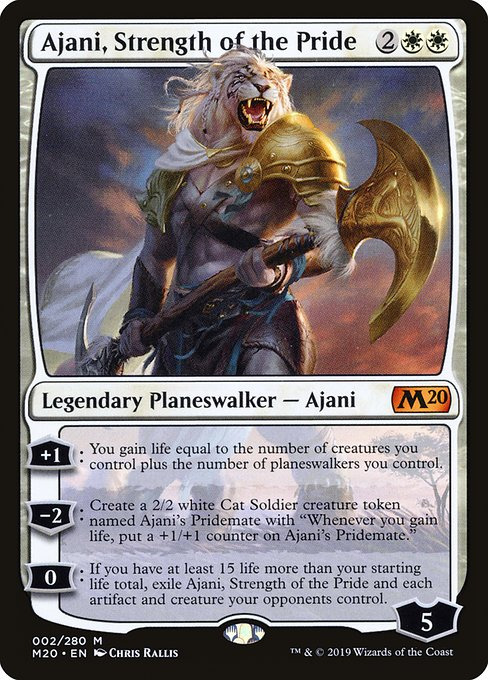
Take everything I just said about Serra, and make it worse, basically. I suppose 4 mana for two Ajani’s Pridemates is fine, but the plus doesn’t do anything (unless you have those tokens, in which case it’s okay) and you are never activating that 0 unless you’re already winning.
Oh also he’s more expensive than she is and is still at the same mana cost. Yeah nah I wouldn’t bother. Ripper in my Cat EDH deck though.
Elspeth, Sun’s Nemesis
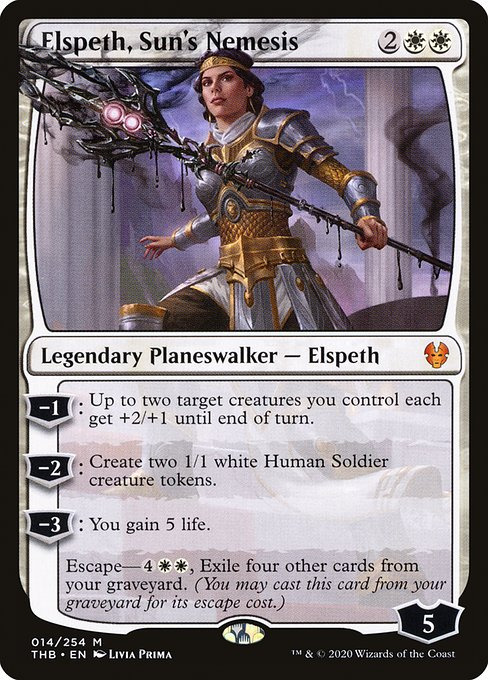
This card is actually really interesting. Our last Elspeth is still mono-white, despite the art and flavour, but she almost doesn’t play like she is. I think most of the time, she’s likely to make 4 tokens and then probably cack it, but the Escape on this is really interesting. By the time you reach 6 mana, you probably will just have enough cards in the yard to cast this again.
I really don’t know how to interpret this card. She’s in my own cube, but I don’t remember seeing her cast yet, so that’s not really any help. My guess is that she’s mostly good in slower decks, but also making and pumping tokens does output a fair bit of damage over time. She’s only like a dollar, so maybe try her out? At least she won’t be an expensive mistake if she is one.
Basri Ket
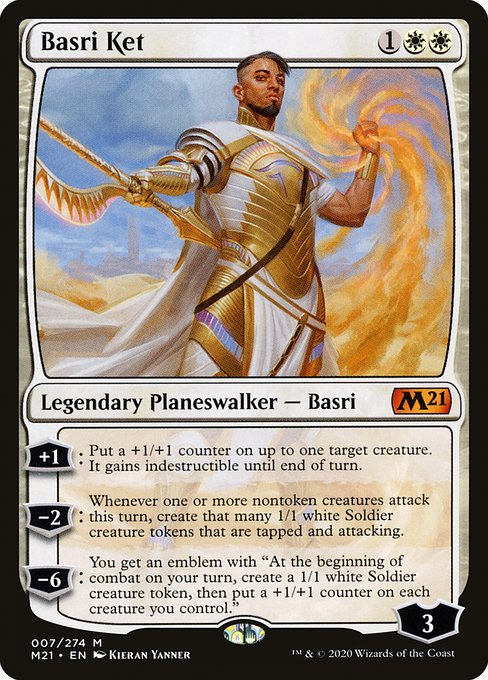
Mr. Sandman here is pretty much just a better Ajani, Caller of the Pride. The +1 does more, the -2 actually puts things on board and is better for aggressive decks to get value out of, and the ultimate is actually attainable. He’s basically aggro-only, but he’ll get the job done in those decks.
However, the 3-mana Gideons kind of just outshine Basri here. He does literal jack squat without a creature on board, and his -2 is quite weak with only one or two attacking creatures to work with. The ultimate is nice, but +1ing over and over is extremely bleh, and you probably have better things to do. So sorry, Basri, maybe next time.
Grand Master of Flowers
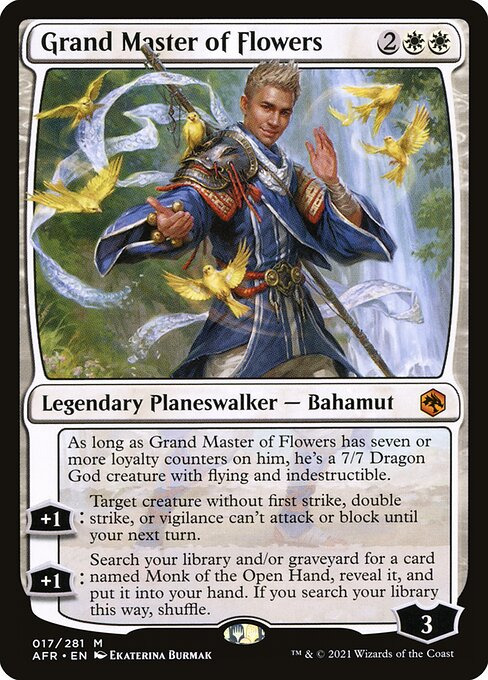
Bahamut, you aren’t fooling anyone, it’s on the typeline. For reference, Monk of the Open Hand is a 1/1 for W that gets a +1/+1 counter if you cast two spells in a turn- so it’s not really worth running? And even if you do put it in your cube, there’s no guarantee you’ll have both in a deck, or want to play both in a deck…so…
Okay, fine, let’s assume you just get a copy of Monk of the Open Hand when you draft the card. I’m still not super enthused about this Planeswalker. The lockdown ability is going to miss more than you think it will, and a lot of the things it misses are the things likely to kill you. It can make a 1/1 every turn, but only one at a time, and if they exile it then the ability does stone nothing. And that “ultimate” takes forever to actually get to. Also it’s another 4-mana White Walker. I think I’ll pass on this one. Somehow, both Tiamat and Bahamut were disappointments.
Teyo, Aegis Adept
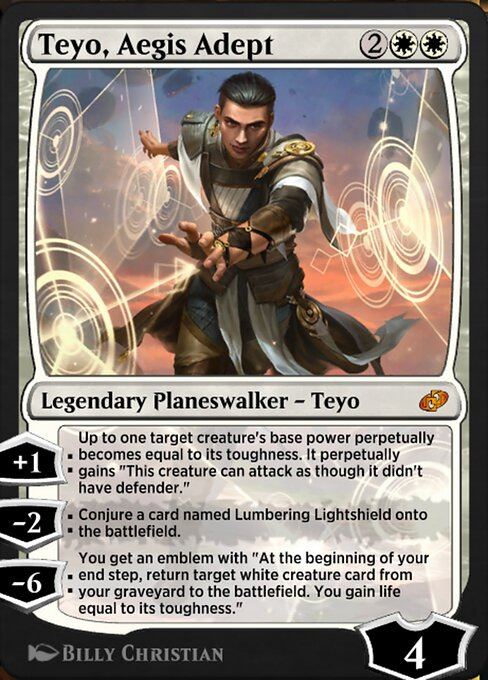
I wasn’t sure whether or not to include this, but I didn’t really want to end on GMoF, so. I’ve done a whole post on the digital-only cards, and I do think Teyo, despite being a Planeswalker, is one of the less fucky ones. You will need to track a lot of things, though.
So how does the card stack up? Honestly, I think it’s surprisingly solid. Aggro probably isn’t that interested, though Lumbering Lightshield’s ETB (makes a random card in the opponent’s hand cost 1 more) could be a real pain if you’re lucky. It makes a 4/4 every other turn for a bit, which is quite solid, and the ultimate isn’t that unobtainable. And you don’t have to worry about money, because this could only ever exist as a proxy.
I’d be really interested to see how Teyo, Aegis Adept plays. I don’t think I’m likely to, outside of Arena-based cubes, with the whole stigma around these cards and the added layer of having to proxy them. But in an Arena cube, with a restricted list of cards he’s competing with (It’s Adversary of Tyrants forward), he could really shine.
This concludes White Walkers, the post. Please join next week when we discuss Blue Walkers. Make your own Game of Thrones joke here, I haven’t watched or read it.
2 notes
·
View notes
Text
Quarry
Chapter Update! FFN and AO3
And we're back, with four chapters as promised! I'm working hard to make sure that everything goes up when it's supposed to, but I recently became a multi-grade school teacher for the rest of the school year on top of everything else, so be warned that I might not be balancing my plates as well as I think I am. Next chapters should go up on April 25th.
Chapter 62
Lily:
"Lily, darling, it's time to get up."
Lily blinked, trying to come out of the lovely dream she'd been having. Opening her eyes she smiled as Elspeth brushed her fingers against Lily's cheek.
"Did I sleep long?" She sat up and stretched.
"Just a touch, but after yesterday I say you earned it."
Lily chuckled and then remembered something she'd wanted to do since she left Enid.
"I'm sorry, Elspeth. If I'd listened to you and Angus this never would have been so awful for everyone."
Elspeth pulled her close and chuckled. "We've always loved your sense of adventure, Lily. I'm happy it worked in your favor. You could have just as easily ended up dead on the side of the road. I'm grateful we have you happy and safe here with someone who's going to look after you and Marly."
Lily grinned. "Do you think you'd be able to come back in the Spring with Angus and Catherine?"
"Of course we will." Elspeth chuckled. "Depending on how your sister handles everything, we might just come to stay."
"She's the worst." Lily groaned. "You'd love it here though! I'm sure James would insist you live here with us at the palace."
Elspeth laughed and stood, "We'll see what happens. But for now, pick out something nice to wear and let's do something suitable with your hair."
That was something Lily had missed since moving away from the McKinnon's. Elspeth, Marlene and Catherine had golden curls that didn't practically allow for their hair to be arranged in the intricate plaits Lily's straight auburn hair did. And from the moment Lily moved in, Elspeth took a great deal of joy in arranging Lily's hair in beautifully intricate styles.
"It's gorgeous!" Lily gaped at her reflection in the hand mirror she held.
Elspeth studied her work before turning to Marlene. "Is it too much?"
"Just make it known that you won't be doing any other ladies' hair and it should be alright." Marlene chuckled.
Lily watched her grin grow across her face. "James is going to die."
"I'd rather not go to the chopping block for regicide, if it's all the same to you." Elspeth laughed. "But I'm glad you like it."
Lily couldn't stop grinning. Her dream during her short nap had surrounded James kissing her like his life depended on it. And looking at her reflection in the mirror, Lily didn't think that would be such a hard dream to make reality.
"Should we pull her away from her reflection?" Elspeth faux whispered.
"I don't know, princesses might need to see their reflection for a certain amount of time each day or they turn into toads." Marlene chuckled.
"They have that in common with Kings then." Sirius came into their sitting room with James hot on his heels.
Lily stopped herself just before she laid into Marlene and turned to see exactly the kind of reaction she was hoping for from James. He looked like he'd been about to lay into Sirius until he saw her. But now he was rooted to the floor, eyes wide with his mouth partially open.
"Wow."
Lily felt her cheeks grow hot. "Thank you."
He cleared his throat and his hand shot into his hair. "Shall, er, shall we join the court for dinner?"
Lily grinned, she rather enjoyed having this effect on James.
"It would be a waste not to let everyone admire Lady McKinnon's handy work," she brought a delicate hand to her hair, "Don't you agree?"
James grinned and stepped right next to her chair, offering his hand. "A shame indeed, perhaps you'll allow me to admire it more fully later on?"
It was Lily's turn to stutter.
"Alright children," Elspeth chuckled, "There will be time enough for all that later on."
Lily bit her lip to keep from giggling and took James' hand.
"Do you enjoy torturing me, your Highness?" James whispered.
"I have no idea what you're talking about, your Majesty," Lily smirked and James nearly growled.
"I have a few things in my study to look over this evening," James pulled her closer, "Could I persuade you to join me?"
"A private audience, your Majesty?" Lily felt like her heart was going to fly out of her chest.
"Only if your Highness doesn't find it too forward," James smirked at her.
"On the contrary, your Majesty," Lily squeezed his arm, "It sounds perfect."
"I think I'll retire early tonight my dears," Elspeth chuckled behind them. "I suddenly find myself a bit tired."
"Mum," Marlene laughed.
"Be nice to your mum," Sirius grinned back at them. "She's had a long journey after all."
Lily shared a smile with James. Everything felt so much better, so much more like it had before it all fell apart on them. And for the first time since the forest outside of Enid, Lily believed her happily ever after was within her grasp.
#Quarry#blackinnon#jily#blackinnon au#jily au#blackinnon fanfiction#jily fanfiction#sirius x marlene#james x lily#sirius black x marlene mckinnon#james potter x lily evans#king james#princess lily#guardian sirius#guardian marlene#marauders#marauders au#marauders fic#romance#fantasy#adventure#royal fantasy au#royal au#fluff#harry potter fanfiction
2 notes
·
View notes
Text
Believe in Me - prologue
Summary: Dan Howell is living at home while he’s saving money for college, which isn’t easy since his parents don’t understand him. Unlike them, he loves dogs, is a vegetarian, has no interest in the family business, and he despises the supernatural. He struggles to accept things that are illogical, even though he is a kitsune. Kitsune are foxes whose powers involve the ability to cast illusions, but Dan just wants to be normal. Phil Lester has just moved to London, where he works as a dog walker. When his path crosses with Dan, Phil is eager to get to know him. Unfortunately, Phil soon finds that being friends with Dan is far more complicated than he could have imagined.
Rating: Mature
Word Count: 2723
Warnings: Slow Burn, Eventual Smut
—
“Tale of the Kitsune” (the oldest surviving Japanese tale about the shape-shifting fox, written by the monk Kyoukai in the late eight or early ninth century):
There lived a man named Ono. He fell in love with a very beautiful lady he met at a vast moor, and soon they became lovers. He married her a year later, and they lived a happy life.
Years later, his beautiful wife gave birth to their son. Simultaneously, their dog also gave birth to a pup. As the pup grew up, it always barked and growled at Ono's wife. She always avoided the pup (now a dog), and became very tense when it was around. One day, it suddenly attacked her violently. She ran and ran and when she got cornered, she had no choice, but to reveal her true form, which was a fox-like creature, in an attempt to scare the dog away.
When she saw that her husband saw her transform, she panicked and leaped over the fence and tried to flee. As she was escaping, Ono called out to her, "You might be a fox, but I still love you! My heart will always be yours. I still want you to stay with me forever. Whenever you want to come back home, you will always be welcome."
That night, and every night after that, she came home to her husband and child. She slept in his arms, and they continued to live happily ever after. From that day onward, the fox was called "kitsune" because kitsu-ne means come and sleep, and ki-tsune means always.
Source: http://japanlover.me/cool/kakkoii-information/tale-of-the-kitsune-fox/
PROLOGUE
1965 – London
Elspeth Smith was alone. She had accepted that she would always be alone, but that did nothing to fill the emptiness inside her – she felt like her skin was a brittle shell surrounding a hollow center, and one day the surface would crack. She would blow away like dust in the wind.
Elspeth was lonely, but there was nothing that could be done about this. She wasn’t like other women. She wasn’t even like her parents. Elspeth learned at a young age that she was adopted. Her parents couldn’t help her to understand herself, and they no longer talked to her. They couldn’t even tell her who her biological parents were, and Elspeth looked but she couldn’t find them either.
Her search for the truth about herself had led her to a career as a secretary in a Social Services office, but she soon found out more about herself in the bookshelves of the mythology section at the library. Kitsune… yes, that seemed to fit. Knowing the name for what she most likely was didn’t offer much solace though. She was still alone.
“Weirdest fucking kid I’ve ever seen. What kind of kid doesn’t like a puppy?”
Elspeth looked up from her desk, surprised by these words. She was even more startled to see a puppy in her coworker’s arms. She shrunk slightly in her chair as the puppy started to rumble with a low growl at the sight of her, but Elspeth hid her fear and asked her coworker, “What kid?”
He gestured to a closed door with the hand that wasn’t holding the puppy. “There’s a little girl in there. She was found living on the streets. We’ve since learned that her parents are dead. I thought a puppy might cheer her up and give her something to play with while arrangements are being made for her, but she freaked out when I brought it into the room. Isn’t that weird?”
Elspeth nodded, though she could think of a reason why a child might be scared of a puppy. It couldn’t be though… the odds of it, of finding someone like herself. Elspeth couldn’t stop thinking about it, and she slipped away from her desk when no one was looking.
She entered the room where the girl was staying. There were chairs, a table, crayons and drawing paper, but the little girl – she must have been 5 or 6 years old – was huddled in a ball in a corner of the room. Her long brown hair was hiding her face.
When the door clicked shut, the girl shivered at the sound. She whispered, “Please don’t bring it back. I don’t like dogs.”
“I didn’t bring the dog back.” Elspeth crossed the room and knelt before the girl. “What’s your name?”
“Gertrude. I like to be called Trudy.” The girl looked up and she wiped her blotchy cheeks dry. “What are you here for? People came to ask me questions already, and I told them everything I know.”
“It’s nice to meet you, Trudy. I’m Elspeth.” She hesitated. This girl was smart, much more so than she should be for her age, so Elspeth had to be careful not to make her close up. “I only have one more question for you: why don’t you like dogs?”
The girl hugged her knees closer to her chest. “I… don’t know how to explain it. Not in a way that would make sense to anyone.”
“Maybe I’m not just anyone. Maybe I will understand.”
The girl bit her lip for a moment, but then she started talking, “Dogs see me in a way that people can’t. People look at me and they just see a girl, but dogs know that there is something different about me. I can’t hide from them. They make me show what I am, and then people can see it, too.”
Elspeth sat in stunned silence when the girl stopped talking.
The girl looked at Elspeth, and then her cheeks flushed. “See? I told you that you wouldn’t understand.”
“No, I do. Trudy, I understand everything.” Elspeth glanced at the door, saw it was still closed, and then looked at the girl again. As the girl watched her carefully, her eyes widened as a fluffy black tail suddenly appeared behind her. The fur billowed, buffeted by a noncorporeal breeze. “You’re like me, aren’t you Trudy?”
Trudy nodded and a fluffy white fox tail appeared behind her. She wrapped the tail comfortingly around her legs, but it didn’t shift the fabric of her dress. “The man didn’t see my tail,” she announced, as if expecting Elspeth to chastise her in the way a protective mother would. “I kept it hidden behind me when the dog scared me.”
“Good girl,” Elspeth said. My girl, she was already thinking.
The adoption went perfectly, but there was one issue that Elspeth didn’t foresee. She had been wrong. Trudy wasn’t a kitsune like her. She was a fox – Elspeth hadn’t been wrong about that – but she was a different kind of fox. She was a gumiho. Elspeth figured this out when the girl insisted she was hungry, no matter what she fed her. Trudy asked her adoptive mother for a special type of meat that her late parents said ‘made her strong.’ Elspeth thought she knew what the meat was, but she still didn’t know what to do.
Elspeth took her to a doctor when the girl started losing weight. The doctor called it ‘failure to thrive’, but he couldn’t help. He stuck Elspeth’s crying little girl with needles, ran tests, and found no answers. As little Trudy became paler and weaker, the doctor eventually started talking about being prepared for the worst. When Elspeth asked him what he meant, he said that she should make the girl comfortable, and make plans… And then Elspeth knew what she needed to do.
Elspeth visited several funeral homes until she found the perfect one, which was run by the perfect man: he was alone, he was trusting, and he was kind. Elspeth came to visit him, and she told him mostly the truth. Her little girl was sick, and the doctor had told her to make preparations; the only thing she hadn’t been honest about was Trudy’s imminent demise. No, her mother wasn’t going to let her die.
The funeral director, whose name was Mr. Howell, went above and beyond to try to comfort the grieving mother. He invited her into the kitchen to offer her a hot drink. He showed her the selection of tea and coffee in the kitchen cupboard, but he didn’t have one she liked, and would he be kind enough to go to the store and buy it? Yes, he was kind enough.
While he was out, Elspeth went to the basement to get what she came for. No one was in the basement but the dead. She opened the drawers in the wall until she found one that was occupied by an unembalmed man whose chest was stitched closed. Elspeth’s stomach squirmed at the thought of what she was about to do, but she would not let her little girl die, and she needed this. Elspeth pulled on a pair of gloves and cut the stitches with a pair of scissors. The man’s ribs had already been cut, so she easily extracted the liver. The bloody organ shivered gelatinously in her hand as she deposited it in a bag that she hid at the bottom of her purse. Then she stitched the body closed so that Mr. Howell wouldn’t suspect anything, and she disposed of the bloody gloves.
She was upstairs and waiting at the kitchen table when Mr. Howell returned with the tea that she requested. She honestly felt bad making excuses to leave without having a drink, but she had to get the liver on ice. Mr. Howell didn’t help her guilt by continuing to be so nice. He even offered her a business card, saying, “My personal number is written on the back. If you ever need anyone to talk to, please call.”
No one had ever been so nice to her. She looked at him – really looked at him for the first time. He was in his 30s (around her age) with tanned skin, wavy brown hair, and kind brown eyes. He was lovely. So, she said, “You know, I think I will call. Thank you.”
Six months later, Elspeth became Mrs. David Howell of Howell’s Funeral Home. At first, she told herself that dating a funeral director and mortician was just an easy way to get continued access to the organs that her daughter needed to be healthy, but eventually Elspeth had to admit to herself that she liked him. He was wonderful with Trudy too, whom they were both overjoyed to see was recovering from her mysterious illness. They had become a family, and they had even decided to grow their family. In 1968, Elspeth gave birth to a son, whom they named James. Elspeth was completely happy, and she could never foresee this feeling ending.
Then, her husband found her standing over a body, holding a bloody liver. Elspeth tried to explain herself and the needs that Trudy had. She even showed him her tail. She thought that he would understand since she knew that he loved their daughter as much as she did, but he only became more horrified. She left with Trudy. Her husband was sitting in a chair holding the baby when she left, clutching their son as if he was protecting him from her.
It wasn’t long though until she knew… she wasn’t sure how she knew, but she knew that her husband was crying for her. He still loved her and he wanted her to come back. So, she went back, and they tried to be a family again. Things were different, but he needed her and his son needed his mother, so he was prepared to turn a blind eye as she took from the dead what Trudy needed.
The children grew and they were happy. It became clear that little James was a kitsune like his mother. His tail was white when he was young, but it turned black when he celebrated his 21stbirthday, though they didn’t understand at the time what that meant. He took after his father too, who he made proud by going to school to be a mortician. It wasn’t long after that that they lost David in a car accident. Elspeth was devastated by the loss, but she saw her son was really a man now when he carried on for the family. He ran the business in his father’s place and he provided for his sister. He didn’t exactly see her as a sister, though – she was so much more to him.
They announced their engagement to their bemused mother, but when they explained things to her she understood. James and Trudy had dated other people and denied their feelings for so long, but no one had ever understood them the way the other did. It would take some time for Elspeth to become used to the idea of her children being a couple, but she tried to be accepting. After her rocky marriage to a human who never completely understood her, Elspeth could see the appeal in marrying a fox, and her children had yet to meet another fox outside of the family.
In the end, Elspeth found that all that mattered to her was that her children were happy. It wasn’t long after the marriage that their family grew again. They named their first son Adam and their second one Dan. At this point in her life, Elspeth was completely content. She was sitting in the parlor of the funeral home (it was also the family’s home with bedrooms upstairs), watching little Adam crawling on the carpet, while Trudy sat with baby Dan bundled in her arms. Everything seemed right with the world, so she was surprised Trudy started to cry.
“I’m scared for them. For my sons,” Trudy explained to her mother. “What are they? Who will they be like?”
Elspeth looked at the babies as she considered it. “I’m sure they’re foxes. I’ve seen dogs bark at them in their strollers. So, the only question is if they are kitsune or gumiho.”
Trudy nodded, clearly at this point in her contemplations. “You raised me and James. Were there any differences? Besides the fact that I got sick?”
There had been some. James had been a mischievous child, but she would almost call Trudy malevolent – her pranks had always gone too far, people had gotten hurt, and Trudy had never cared. Trudy didn’t need reminding of this, and they couldn’t be sure if this part of her nature really came from the fox. Also, all of her energy was now focused on being a protective mother, so Elspeth wasn’t going to judge her daughter for her past. “Well,” she said. “There was the way his tailed changed color when he became a man.”
They still didn’t know why James had a black tail, though Trudy’s tail had stayed white. They assumed it had to do with how he was a different species of fox. Trudy shook her head, looking at her sleeping son. “This can’t wait until they’re grown. What if they get sick like I did? If they’re gumiho they need to eat what I eat to stay healthy and grow.”
Elspeth gave her daughter a sad look. “You want them to be gumiho.”
“Of course I do! I brought them into the world. I…” Trudy didn’t need to explain it. She was young, but they had all noticed it. James was 8 years younger than his wife, but the difference wasn’t noticeable. He was aging and she wasn’t. They knew it must have something to do with the lifeforce she obtained from the livers, and she was coming to accept that she was probably going to outlive her husband. She didn’t want to outlive her sons. How could she even comprehend the possibility, while holding her newborn in her arms? She couldn’t. Trudy looked at the baby and insisted, “He’s a gumiho. They both are. I know it, and they need to eat what I eat.”
All Elspeth could say was, “I’d suggest waiting until they’re ready for solid foods.”
Trudy nodded. “And let’s do some research. I know you tried to find out what you were through books when you were younger, but maybe there is more we can find out now. When they’re older, I want to be able to explain to them what they are.”
2 notes
·
View notes
Text
Rich World-building and Magic the Gathering
So this is a post I’ve wanted to make for a while, but I decided to wait for Hour of Devastation to come out because a lot of it is based on Amonkhet block as a whole. Originally I was going to call it “Shallow Worldbuilding” and talk about how the worldbuilding since Battle for Zendikar block has been dissatisfying to me, but I decided to flip it and talk about when magic has done it exceptionally well instead.
First I want to note that narrative and worldbuilding are obviously different elements of story. The kind of stories you can tell through trading cards lean heavily toward worldbuilding. It’s easy to show setting with magic cards, but it’s much harder to show things like character development, plot progression, twists, climaxes, rising action and all that stuff. This is why in general, second and third sets of blocks are less favourably received than the first, because the first set’s entire job is introducing you to the world.
The story columns that go up on WotC’s website are probably better now than they ever have been before. I remember trying to get in to magic’s story back in return to ravnica, and finding a bunch of disjointed short stories giving snapshots into what life on the plane is like. This is something the cards already do, so using magic story to provide the core narrative is shoring up a weakness pretty cleverly. However, as the magic story columns got better, something happened. The worlds became less interesting, less real. Maybe it’s because they became more focused toward supporting the core narrative when creative got better at doing that. To show you what I mean, I want to talk about an example that did it right and one of my favourite worlds that WotC has ever made: Theros.
I don’t hear that much positivity around Theros. Mechanically, I can see why the set disappointed some people, but creatively I see it as a massive success and it’s largely the measuring stick I compare future worlds to. The reason why I love Theros so much can be summarized in one card:

Setessa, one of the three main poleis of Theros, is a Matriarchal society of adopted orphans that encourages it’s young men to travel around the world once they reach a certain age. I remember this because it’s such a strange and obscure fact to put into the world of a card game. It does not affect any aspect of the story and has no ramifications for Elspeth’s quest. But it does flesh out the world, and assure us of it’s depth. I remember Setessa, Meletis and Akros because they have distinct identities even beyond the colours they are attuned with. I even remember Asphodel and Odunos, the two undead cities that typify the different kinds of Noston in the world. I have some idea of idea of the life a person might lead in Theros.
When building a world for a story, your first job is to convince me that people live there. Whatever you do next - for example, destroying that plane and wiping out it’s people - will not matter if I don’t accept the verisimilitude of your world. Part of verisimilitude is obscure, almost illogical details like the ritual exile of young men from Setessa. This is not in the story for any plot-related reason, so I have to conclude it’s there because it’s part of what it means to be a Setessan, just the same as there is no logical reason for why we dress our children up like monsters and tell them to ask strangers for candy.
Zendikar has a rich, believable world with a recognizable identity but Battle for Zendikar forgot this depth and unleashed devastation upon a populace that didn’t feel real for me, and left me unmoved. Innistrad is a masterclass in tone, but it is less a world than it is an aesthetic or a gallery of horror tropes and so creative can feed it’s citizens to all the eldritch monsters they want and I won’t care (okay, except for Hal and Alena). Naktamun is a name I had to look up even though the block it features in isn’t fully released yet, because it has roughly the identity of only one of the major cities in Theros’ setting. Why is this?
For me it comes down to a lack of detail. Everything we’ve seen in Amonkhet about their culture is purposeful, and part of a very precise machine - both the diegetic (or in-world) machine of Bolas’ plot and the non-diegetic machine of Creative’s storyline. The amount of contrivances that Amonkhet’s setting has to jump through in order to make the plot work is ridiculous. The Gods are so easily manipulated that they seem scarcely more competent than a mortal - indeed, they are less astute than Samut is - and the city of Naktamun somehow has to survive in an isolated snowglobe. Now yes, everything is explained; the people of Amonkhet were left without elders to guide them and the gods were brainwashed by Bolas, so the city was entirely indoctrinated. Every single citizen can spend all their time training for trials that they die in because the annointed zombies take care of everything else. It all holds up to logic (a flimsy fantasy logic but still) but the end result isn’t really anything interesting. Naktamun has no artisans, no artists, no politicians, no history, no traditions or culture outside of the one forced upon them. Naktamun is a factory, a never-ending gym class, because that’s what the story required. The entire setting of Amonkhet is a means to an end, that end being Bolas gets an army. Was that worth it? You have to ask that question with every story-telling decision you make. You gave up the opportunity to craft a detailed fictional culture for the opportunity to give Bolas’ zombies a backstory. I would have preferred an Egypt set in a real, living world. Frankly you could tell me that Bolas somehow attained a zombie army off-screen and I wouldn’t question it, considering it’s just fine for him to brainwash and/or mutate gods off-screen just fine.
The creative team is really good at what they do and I have a lot of faith in them, but I’d urge them not to get lost in just tying up the loose ends of a plot. This is a cold and mechanical way to tell a story. Remember that the first and most important step is to populate your world with something we can believe in, and ask if what you are giving up is worth what you are getting in return.
Finally I want to just throw back to the last time we had a rich, developed world and a solid core narrative at the same time by talking about Khans block. Khans of Tarkir is my favourite set and block because we got a world with ten distinct, well-rounded cultures and a rich history that we were allowed to experience. Khans block is when the online story columns started to turn around, so we had weekly chapters that kept us updated on the core story and snippets of the expansive, beautiful world of Tarkir from the cards. I remember the names of Tarkir’s river deltas, swamps, mountain ranges and monasteries. It incorporated aesthetics of Mongolian, Ottoman-Turk, Tibetan, Siberian, Persian and Indian inspiration without losing it’s identity to them.
We wanted a return to Zendikar because it felt like we were escaping to a world of adventure and possibility. We wanted to return to Innistrad because it’s identity resonates so deeply. Kaladesh was wonderful because our first experience of it was the Inventor’s Fair, which was a beautiful example of the world’s culture. It’s the worlds you invent that keep us coming back. The Gatewatch are fine, but the real protagonist of any block should be the setting. I don’t care about the inner workings of an assembly line, and I won’t be clamoring for a return to Amonkhet anytime soon.
146 notes
·
View notes
Text
Of those that call/fear the death of the Gatewatch:
Really, folks that demand death either hate a character or want to see a story with 'real consequences' do not understand that first: death is the end of setting the stakes, and rarely a way to raise them. Death of a major character comes at the end of an arc, not at the start because (secondly): magic by it's very nature is fantast. Unless it serves the plot and makes sense for the character, death should not be so easily done. Elspeth's death fit the themes and style of theros/greek tragity. People hated her dying, but it wasn't just for shock.
Of the gatewatch right now, only a single member really has any build up or reason to die here, and that is Gideon. They have already been foreshadowing it. He is going to die at some point, though maybe not on amonkhet.
Jace has unfinished business on Ravnica, Lili has one more demon to fight, Chandra would be a cheep shock death given that she just finished out a major story thing for her iwth her mom and the return to her hom. Nissa is still in the middle of character growth that has been a bit slow (but wonderfuly so if you ask me). None of their deaths would be satisfying (in a story sense) or make sense or be worth anything to the metanarative.
BUT, brought near to death? Loosing a whole plane even? Having every strength of theirs used against them? shoved in their faces? Their hubris given form?
The funny thing is, they lost on Innastrad. They lost, but the problem is, outside Jace, they just didn't know it. And even Jace... when he has his own issues.
In the end, there are fates worse then death, and ways to make drama without the same.
I just hope there is something left of Amonkhet and the gods to return to... maybe something like the sand given to Bastian in The Neverending story?
163 notes
·
View notes
Text
Death in the Gatewatch
@vorthosjay has had a few asks lately about why the protagonists of the mtg story aren’t losing enough, which the asker defines as dying. I think it’s possible to lose without character death, and think the Gatewatch have been losing/suffering, but it’s inevitable that at some point a member of the Gatewatch WILL die.
This post, therefore, is pondering WHO is most likely to die when the time comes, primarily from a narrative standpoint. I’d be interested in other fan’s views! Below the read more I consider the members of the Gatewatch in color pie order, before reaching a final conclusion on who I think is most likely to face their end.
Gideon
Gideon has become one of the most developed members of the Gatewatch in recent stories. He was instrumental in founding the Gatewatch during the Zendikar arc, and my gut feeling says we’ve had more perspective sections for him during the Kaladesh arc than any other member, except maybe Chandra. Despite this, he’s not had a particular narrative: he fights to protect people, but he hasn’t got a single fight that is driving him onwards. The stories are less about him, but he is building up to be an important source of strength within the Gatewatch: dependable, reliable. He also has a close, protective relationship with other members, especially Chandra, with hints of a burgeoning relationship there.
Gideon dying would carry a lot of emotional weight, both underlining the power of a foe (killing the invulnerable warrior), and having an emotional impact on other members of the Gatewatch: Chandra would lash out, Ajani would see parallels to Elspeth, Jace would feel forced to step into the leadership void. For this reason, he is near the top of my list of likely deaths.
Jace
Jace has been quite quiet lately: I didn’t get much of a sense of his personality during Shadows, where he largely served to draw Liliana in, and he is not a focus for Kaladesh. Despite this, he is sort of a leader for the Gatewatch, clashing with Gideon over who directs their efforts. He has established conflicts with several antagonists (such as Tezerret), an important role on Ravnica, and is known to neutral parties who may be important again (Ugin). He also has an unfinished story in returning to his homeplane and rediscovering who he is. On top of all of this, Wizards have repeatedly indicated that he is the most popular planeswalker.
Jace dying would carry emotional resonance for the fans: he is divisive and has been a symbol for a long time. However he carries a lot of plot strings: visiting Vryn would be more unlikely if he dies, and he is closely tied to the most popular plane, Ravnica. The only circumstances I can see Jace dying would be as part of a Ravnica 3 that takes place after a visit to Vryn: either he dies on Vryn and Ravnica 3 deals with the fallout, or he gets a large personality change from his visit which resolves with his death or incapacitation on Ravnica.
Liliana
We all know Liliana is going to betray the Gatewatch at some point. She joined to gain a useful resource, but to date hasn’t shown her hand in this regard. She is testing the limits and conflicts within the Gatewatch: pushing Chandra in particular in ways that make her more vulnerable to later manipulation. Storywise, Liliana has a lot to follow up on: she has links to Bolas and a pact with demons which she will likely wish to use the Gatewatch to resolve, n ot to mention the Chain Veil. Her homeplane is Dominaria, which we will almost certainly return to at some point, although she s not exactly grounded there: she has the weakest link to her origin plane of all the Gatewatch.
Liliana dying would create complicated feelings in the Gatewatch, and at this stage is most likely as part of a heroic sacrifice (the trope of someone distrusted doing something to change people’s opinions of them). But a heroic sacrifice is ridiculously out of Liliana’s mindset, and she has a similar number of story ties to Jace which would be left hanging if she died (and which would be even harder to follow up without her). I expect she will someday leave the Gatewatch and become an antagonist, but this has not been set up enough yet. Amonkhet may begin to provide this setup though: from the artwork of Liliana’s demons, I wouldn’t be surprised if Razaketh was there (Liliana takes Gatewatch to Amonkhet to deal with him, ends up with surprise Bolas?), and then the fourth demon, Belzonlok, could appear a block or two later.
Chandra
Kaladesh is Chandra’s story. She has returned home and found her mother, and is struggling with the emotion of fighting for her home. With this thread complete, she hasn’t got a lot of story threads left: her monastery will be fine by itself, and she isn’t being driven by a lot else. The antagonists are not yet HER antagonists. She is, however, becoming an emotional heart for the Gatewatch, particularly with links to Gideon and Nissa.
Chandra dying would incite the rage of the Gatewatch (appropriately). Gideon and Nissa would be devastated in their own ways, and Liliana would feel she has lost a useful tool (which may be a spark to stop seeing people as tools). Despite this, I don’t see it happening. Chandra is a popular character, and can easily find new things to care about while not becoming mired in the deep story threads that tie the others in. In addition, she is suffering already: the injuries she suffered on Zendikar are still affecting her, and I in fact would not be surprised to see her become more heavily injured through Kaladesh resolution. Wizards are keen to have representation, and it would not be outside the scope of the current story for Chandra to permanently lose the use of her legs through a resurgence of her Zendikar injuries (although given the magical healing other members have available, this would likely be a disability that recurs at the worst possible points rather than being entirely permanent).
Nissa
Nissa’s story was Zendikar. Her world is saved and the eldrazi defeated, yet she carries on fighting with the Gatewatch to ensure other planes are protected. I’d say she has the least connections to story outside of the Gatewatch: she is the newest walker in the six, and hadn’t really appeared in non-Zendikar stories before joining the Gatewatch. The only other plane she has a link to, Lorwyn, is unlikely to be revisited (alas). Yet she has become a backbone for the Gatewatch: I think she is one of the most powerful members, and is emotional support for the others, especially Chandra. Nissa’s story is about finding her place in the multiverse and opening up to others, realising that although they don’t share her deep connection to nature they are still important to her.
Nissa dying would significantly weaken the Gatewatch and would have an impact on some of them, particularly Ajani and Chandra but also Gideon, who I expect has become to depend on her. She also symbolises more than any of them what brought them together in the first place. I’d say her death is one of the more likely possibilities: it would show the strength of a foe and remove a stabilising force in the team without jeopardising the stories linked to her.
Ajani
The newest member of the Gatewatch is still finding his feet in the group. He is likely to be a galvanising influence, taking them in a more protective direction by supporting the motivations of Gideon, Nissa and Chandra. He is a recognisable figure and has ties to story, particularly Bolas and the inevitable return of Elspeth from the Theros Underworld, but also as a link to the Planeswalker Story Circle (who are likely to be allies in future). He is very much a supporting character though: I’m not sure I could see a block focussing on Ajani without a bit more development of the character’s links to the rest of the Gatewatch.
Ajani dying would have an emotional impact on the Gatewatch, as it would likely be self-sacrificing and underline how much this relatively new member believed in what they were doing. Bolas likely wishes vengeance on Ajani, but I can’t really see this happening immediately, not least because of the links to Elspeth: if Ajani dies, it will be after a return to Theros. Of course, he may be being set up for the ‘death of a mentor’ trope, though he isn’t much of a mentor to the other gatewatch yet... I could see him fulfilling this role for Gideon though if their relationship is developed.
Conclusion
For me, there are two likely candidates for death in the Gatewatch: Gideon and Nissa. I don’t think it’s a coincidence that they are both being set up with emotional ties to Chandra, or that Ajani is in their colors. Of the two, I think Gideon is the most likely candidate: he is a figurehead and would leave a void in the Gatewatch which would leave Liliana able to increase her influence over Jace and Chandra. In fact, my predictions for the Amonkhet storyline:
- Liliana convinces the Gatewatch to go to Amonkhet so as to kill one of her demons (likely Razaketh), possibly under a pretence of chasing Tezzeret. She assumes that Bolas won’t be there for whatever reason.
- Razaketh is killed, but the circumstances in which this happens allows for Bolas to return to the plane. This takes place at the end of Amonkhet/start of Hour of Devastation.
- The Gatewatch fight Bolas, urged on in particular by Ajani. Gideon is killed and the Gatewatch forced back.
- Gideon’s death causes a split in the Gatewatch. Jace feels he has to take command but realises how much he depended on Gideon. Liliana exploits this to carry on using the Gatewatch to accomplish her own goals through manipulating Jace. Nissa, aghast, stands against her, perhaps leaving for a bit but returning having realised that she can not stand above this. Ajani supports Nissa (and fills the white void left by Gideon), and Chandra is pulled between the two factions, getting love and support from Nissa and being stoked into vengeance by Liliana.
TLDR: Gideon is my pick of most likely to die in the Gatewatch, which will lead to two Gatewatch factions led by Nissa and Liliana.
16 notes
·
View notes
Text
Fact or Fiction: Chapter Eleven
Rated M for abuse, sexual content, and discussion of rape/non-con. Canon-typical violence.
Summary: It’s Ral Zarek’s sixth year at Hogwarts. And everything would be fine if Jace wasn’t totally occupied with his new girlfriend, to the point where it’s honestly kind of weird, and Ral’s starting to be concerned. Now if only everyone would stop telling Ral he’s just jealous and LISTEN to him…after all, he’s NOT just jealous, right? (Sequel to Send to Sleep.)
Ships: Jace Beleren/Ral Zarek, Harry Potter/Draco Malfoy, Luna Lovegood/Hermione Granger, Nissa Revane/Chandra Nalaar, Elspeth Tirel/Teysa Karlov
A/N: Many, many thanks to @paperclipminimizer for beta-ing and checking my timeline, as well as answering all my questions about Harry Potter. Thanks also to Juri, @dragons-suck, and everyone on Sketchydoodles’ Vorthos server for listening to me rant about this thing as it took shape.
Also available on AO3 and FFnet.
Prologue
Chapter One
Chapter Two
Chapter Three
Chapter Four
Chapter Five
Chapter Six
Chapter Seven
Chapter Eight
Chapter Nine
Chapter Ten
Chapter Eleven: Reforge the Soul
Emmara was the most beautiful thing Jace had ever seen in his life. Her hair fluttered slightly, glowing in the flickering light of the active spell. Her bright blue eyes were like twin jewels, and her smile—why is she smiling like that?—was a sweet, full grin, lips drawn back to display her teeth. Someone’s screaming. Someone’s hurt.
She’d told him he could help her. If he helped her, she’d let him stay by her side forever, and that was the only thing he wanted. Just to help her and to be allowed to hold her and look at her lovely form, the curve of her hips and breasts, the tightness of her hand holding her wand. They’re still screaming. The voice sounded familiar.
Something’s wrong. Jace’s head hurt. Emmara had said to wait patiently and help, but his head hurt. Flashes of pain like little lightning bolts kept jabbing into his skull. He’s hurt. Don’t hurt him. Stop. Wincing, Jace put a hand to his head. Emmara had told him not to worry. So he shouldn’t worry. There wasn’t anything to worry about. Yes, there is, you idiot! That’s Ral! Ral’s hurt!
Of course it was Ral. He’d been in Ral’s head more than he’d been in anyone else’s. He’d recognize Ral’s thoughts anywhere. Jace won’t let you do anything to me. His mind pulled the statement, and somewhere inside he realized that it had been a long, long moment since it had been spoken. Ral is screaming.
Emmara’s wand was pointed at Ral. Ral was screaming. There was another thought in there, the middle thought, the second out of three thoughts in the logical progression, and it wasn’t coming. Jace couldn’t make it happen. He couldn’t think it. That wasn’t right. That was—oh Merlin—that was definitely not right.
He wanted to be calm—he was calm—but, Jace was suddenly convinced, he shouldn’t be calm. But he could use that. Since he was calm, he could easily focus inwards—he’s screaming Ral’s screaming oh god oh Ral oh no—and look at his mental walls. No, he thought calmly, surveying them, he definitely should not be calm. There were holes everywhere—little ones, tiny ones, but something pink was oozing or wafting through each and every single one, like a huge spiderweb crisscrossing through his mind.
All right. He needed to get rid of that. It shouldn’t be too difficult now that he knew it was there, because thankfully Professor Potter had drilled him in all sorts of tricks for dealing with mental invasion. And he was so blissfully calm that it was simple to do a quick check, find all of the holes, and simply shutter them closed all at once.
The pink threads snapped with a soft mental ping. Emmara is hurting Ral. There it was. There was the thought. And Jace wasn’t calm at all, not anymore.
“Stupefy!” The word ripped from his throat before he even knew what spell he was casting. Emmara gasped and staggered forward, her own spell—the Cruciatus curse—snapping as her wand arm fell.
“Jace, what are you doing?” she panted, somehow still upright and beginning to raise her wand again. “You can’t possibly—”
“Stupefy!” he tried again, but this time, impossibly, she turned it aside with a complex wand movement.
“You stupid boy!” she snarled. “How did you shake off that much Amortentia? Oh, never mind. Cullah.”
The last word coincided with a sudden blue light emanating from the end of her wand. Jace, finding reflexes he hadn’t known he possessed, just barely managed to throw himself out of the way before it caught him. But before she could raise her wand to try again, he had his own up. “Legilimens.”
I won’t go back to the earth. The cold place the damp the dark the rot worms crawling across flesh I won’t go back and I won’t die.
Yes, you will. Her mental walls were strong, but they weren’t strong enough. Not when all Jace could hear were Ral’s screams echoing over and over and over again. One last burst of pain, and then the touch of Ral’s mind was fading. It took him an instant to feel the shape of her thoughts, but it wasn’t so long that he couldn’t react to her next attempt.
“Protego!” Jace shouted at the same time as Emmara—and that wasn’t her name, of course that wasn’t her name—screamed out another spell. The shield charm reverberated with the impact, and he felt her mind reaching for another spell that would disintegrate it. From somewhere, he found a spell that let him detach the shield charm and briefly cast an invisibility spell. Hidden, he let her focus on disintegrating the shield as he concentrated on deepening the connection between them.
He winced as the shield went down, because the spell she had used was tailored to follow the spell back to the caster and—dragging the wand movements from her mind by main force, he was just barely able to stop the spellwyrm from getting to him, but he had to drop the invisibility to do so, and he looked up to find Liliana’s eyes locking with his.
He felt the impulse in her mind, but this time wasn’t quite fast enough to stop it.
“Dorchadas!”
Jace’s vision went black, and now she thought she’d won, because it didn’t matter what he was doing in there, he couldn’t possibly stop her when he was blind—
He’d practiced finding other minds a little, mostly with Ral, but the hard part wasn’t really knowing they were there or finding them or getting in—it was staying afloat, staying him amid the sudden sea of memories. Legilimens protected you somehow, and following his blind, instinctive sense didn’t, but Jace didn’t know anything right now about who he was, and all he wanted was to see her scream and bleed and writhe
And it was so easy to find someone else who wanted the exact same thing.
I’m Teysa yes I’m a squib yes I can still fuck you up
Practicing in her room for hours, all the wand movements perfect, but still no response, still nothing nothing nothing
We’re disappointed in your progress
The Dark Lord won’t be pleased—have to hide her—keep her safe—
Why would we want to keep her safe?
She’s our child.
She’s a mistake. A freak.
Us freaks have to stick together.
Teysa’s point of view wasn’t perfect, but she was happy to help, and she was used to looking at things from the wrong angle. She knew how to tell someone else to move. As the dark witch advanced on them, it was actually quite helpful to have a broader perspective on the scene. Jace alone might not have seen the cauldron, and he might have tripped over it. But Teysa saw it, and Teysa knew how to navigate when your footing wasn’t secure—too much dark magic near the delivery room or maybe a curse, we can’t fix it, could also be why she can’t use magic—and they danced to the side, easily evading the witch’s spell.
Not expelliarmus, the witch would probably expect that—but she couldn’t cast spells if she couldn’t use her arm, could she? They grinned, and oh Merlin, the feeling of magic dancing, sparking through her veins for once was exhilarating, it was beautiful, it was exactly what she’d imagined. They hesitated, one brief heartbeat of but should we? But sometimes you had to be vicious, and you had to hurt them before they could hurt you. Before they could hurt you more.
They hit the floor, rolled. It was dizzying to watch and feel, but it wasn’t so different from playing Ral’s old video games, the controller vibrating in their hands. Just a little more disorientation, and they were used to being disoriented. “Ossum ruptor!”
It sounded like a piece of plastic snapping. The witch screamed, wand falling from her fingers without her control, and bounced to the ground. “Petrificus totalus!” And she was falling, frozen like she’d frozen Teysa, in front of Ral’s limp, unconscious—please be unconscious please he has to be unconscious—form.
She was sobbing and terrified, but they didn’t care; they were raising their wand even as they advanced on her.
“Please—I don’t want to die—Jace, please.”
The streaks of white were widening in her now-dark hair, and she looked pitiful, scrunched onto the floor in a crouch, her big eyes red and puffy with age and tears. They didn’t feel anything but a quiet nausea. This woman had violated Jace in every conceivable way—he couldn’t even trust his own thoughts anymore. And she had made Ral scream; she had nearly killed Elspeth and Nissa, sucking out their life force to extend her own bloated, sickening existence. She was going to pay fot that. She was going to—
Their wand arm wasn’t even trembling as they raised it. “Avada—”
Jace’s world flattened and then dissipated in a wash of bright light.
4 notes
·
View notes
Text
Halloween by Paula Guran (editor)
Rating
Review
*** This review originally appeared on Out of this World Reviews. ***
The hardest part about writing a review for a collection this diverse is coming up with a singular opinion to describe the entire ensemble of stories. Halloween, edited by Paula Guran, is a rich collection of seasonal stories by the likes of Charles de Lint, H.P. Lovecraft, Peter Straub, Glen Hirshberg, and many more. It contains poems, short stories, and a few works which either reach novelette status or come really close. The shortest story is a few pages. The longest, well over fifty. The only story missing from the Kindle version of the book is Ray Bradbury’s “The October Game” because Bradbury’s estate does not allow digital versions of his works (If that is a particular concern, I recommend purchasing the print version, which does contain Bradbury’s contribution). Guran does include a summary of the missing entry, though, which is especially useful since the very next story, “The November Game” by F. Paul Wilson, ties directly into that one.
“Halloween” stands in at 480 pages. It contains everything from the macabre to the hilarious to the downright depressing. The horror of some stories is driven by supernatural forces; others by the pure evil nature of seemingly ordinary people. Across all of the stories there is a wide array of characters, from the deranged to the just, from the old to the young, from the human to the inhuman. Needless to say, there is something for every Halloween fiction enthusiast here.
Guran begins her collection with a fairly long preface discussing the origins and evolution of Halloween, which likely sprung from the Celtic festival of Samhain. Little is know of the practices and rituals associated with Samhain since the Celts did not write anything down, but it is believed that in their culture faerie-folk were resentful of humans, who slowly were taking over the world. During Samhain, the faerie-folk’s power was enhanced, and thus so was their propensity for mischief. Samhain was eventually adopted by the Christians, who made it into a celebration of the Virgin Mary and martyred saints. October 31 became All Hallows’ Eve (‘hallow’ was synonymous with ‘saint’ during the Middle Ages), though the old ways did not die out so easily. Today, Guran proposes, the holiday is really split in half between adults and children. For grown-ups, Halloween is the third biggest “party day” of the year (New Years and Super Bowl Sunday are first and second, respectively). While the modern celebration of the holiday has mostly been confined to North America, retailers are slowly pushing it into other markets as well, including Japan.
As far as the stories contained in “Halloween,” I found many enjoyable. There’s “The Halloween Man,” which tells the story of a demon that rises once a year to hunt for children’s souls. “Pork Pie Hat,” which I’m still scratching my head over (but in a good way). “Three Doors,” a moving tale also included in Norman Partridge’s Johnny Halloween. “Auntie Elspeth’s Halloween Story, or the Gourd, the Bad, and the Ugly,” a hilarious story within a story told when three grandchildren are unceremoniously dropped off to visit their aunt. The list goes on from there. All told, there are over thirty stories and poems to read.
“Halloween” would have earned a solid four rockets if not for the numerous typos I discovered while reading. Many readers demand perfect spelling and grammar; I am one of them. Some of the errors were simple characters missing. Others were entire words or a repeated word. These sorts of errors jar the reader from the experience and are somewhat easily corrected by employing a good line editor and proofreaders.
That aside, Halloween is such a diverse blend of Halloween stories there’s really something for everyone here. I give it three rockets and a solid recommendation to add it to your Halloween reading list.
0 notes
Text
The Face of War (Alara) By Jenna Helland (4/14/09)
The Riftclan Tol Breot was lost in an unfamiliar land. They had been camped in a rocky enclave in the Rift Valley when suddenly the world shuddered, twisted, and then blasted them into this fetid hellscape. Half of their clan had simply vanished. In the confusion immediately following the shift, rot-skinned ogres assaulted them and slaughtered several more before the warriors killed them.
Now they were surrounded by grey, fleshy ground where nothing grew. There seemed to be no creatures of any kind save walking bags of bones that shambled past—easily killed, but providing no meat. The clan's chief, Breot, wouldn't let them eat the dead ogres because of the weeping sores covering their carcasses. Very soon, hunger would be their enemy.
Breot sent out a hunting party to look for familiar landmarks, but by the time they returned, half the clan had fallen ill with a horrible pox. Had they still been in Jund, they would have left the sick behind to make it easier for the healthy to survive. But Breot made the unexpected decision to keep all the survivors together and nurse the sick. No one questioned him. This land was too ominous and wretched to leave anyone to die. There wasn't even wood to build a pyre to honor those who had been killed. With a growing sense of unease, the clan stayed close to the camp, watched the sky for dragons, and wondered how they could return to the world they knew.
Greasy black clouds were rolling across the horizon when a black-haired boy stumbled into their encampment. He seemed barely human—the scrawniest grub of a child any of them had ever seen. One of the young mothers took pity on him and offered him some of their remaining tukatongue nuts. His dry lips cracked and bled in his effort to chew the hard shells.
"Where are you from?" Sonara asked the boy, clutching her own baby to her chest and passing him a bowl of rank water.
"Torchlight," he answered. When no one replied, he finished chewing and wiped the blood from his bone-white chin. He gazed intently around the fire circle through eyes that looked much older than they should. "You must flee. Quickly."
"The Riftclan does not flee," Breot informed the strange child, who stared back at the imposing chieftain without fear.
"Then your heart will be torn from your defiled body," the boy replied.
Had they been at home in Jund, Breot would have killed the boy instantly for such an insult. But the pale child seemed almost like an apparition, and his voice was so disconcertingly calm that Breot hesitated, his hand on the hilt of his obsidian blade.
And then they heard it. A rush of desperate, forlorn voices swept like wind through the camp as thunderous footsteps shook the ground. The clan's members staggered to their feet. Hardened and ferocious, the Riftclan were no strangers to death or suffering. They had seen their kin slaughtered by tooth, claw, and sword. But what swept over the ridge was beyond their realm of knowing. This was terror embodied, clad in spikes and standing over seven feet tall. Leading swarms of undead, Thraximundar charged down the hill and cut Breot down before the chieftain could raise his sword or utter a single word. As undead minions engulfed the clan, the boy scurried into the darkness, spreading news of the carnage like a plague upon the land.
Valeron, Bant
He cannot be killed. He cannot be stopped. He is coming. Frightening tales passed through the line of refugees clogging the roads toward the Sun-Dappled Court. Where are the Knight-Captains?What is to become of us? Won't anyone help us? Weary and frightened, the refugees trudged forward because they didn't know what else to do. Late one afternoon, a battle-stained regiment of knights galloped through the stream of refugees. One of them proclaimed the good news of the battle of Tower Stele. A warrior-mage decimated an entire army of the hellish invaders! She will slay Thraximundar.Our borders will be safe once more!
Late in the afternoon, a caravan of Balmgivers from Topa reached the refugees with food and healers. That night, the name Elspeth was spoken around campfires and inside healing tents. She is as powerful as the angels. She will lead Bant in its time of need.
The next day, a black-haired boy appeared. The child moved between families, asking for a bite to eat and sharing harrowing tales of flesh-eating monsters and flesh-twisting necromancers. In hushed tones, he warned of the coming of Thraximundar: You would be better to cut your own throats than become one of his undead minions. Every kill just makes him stronger.
That evening, he shared soup with a blacksmith and his family who had escaped from the ruins of Giltspire.
"Knight Elspeth will be at Sun-Dappled Court," the blacksmith told his wife excitedly. "She's bringing an army of elves and catfolk. They will assault Thraximundar before he ever reaches Valeron."
"Thanks be to the angels," his wife Elleta murmured, followed by a chorus of their children's voices," Thanks be to the angels."
But the little boys narrowed his eyes. "Do not entertain false hopes," he told them quietly. "I was at the battle of Tower Stele, and Elspeth will not save you."
"Elspeth will save us," the blacksmith insisted. "She is the hope of our nations."
"Elspeth is gone," the boy replied, with a slight sneer on his lips. "She saved the Tower Stele, but committed a heinous crime in the process. Death was the only honorable course of action."
"Speak clearly, boy," the blacksmith boomed, looking into deep pools of black that were the boy's eyes. "What are you saying?"
"She threw herself on a pyre and scattered her essence to the winds," the boy replied. "I saw it myself."
The blacksmith turned to his wife, who sank to the ground and covered her face with her hands.
"You should tell everyone," the boy said sagely. "Before the false hope gathers in their hearts as well."
Dragons besieged Antoris City. It was an infuriating situation, but not one that the mechanists and mages couldn't handle—at least so far. Around the clock, they kept a spell-wall around the city, which kept the marauding viashino away from the gleaming buildings and monuments. But the skies were more difficult to guard, and a broodmother and her young whelps had discovered that there was easy prey on pristine boulevards. Esperites were forced to keep to their houses during daylight hours. At night, the scullers from Darkreach District were enlisted to scour blood and rubble from the streets. But most citizens simply pretended that their city hadn't emerged on the side of a volcano and kept to life as usual.
As an arcanist, Lifris was more suited to the library than to guard duty. But all mages were required to man the spell-wall, so he did what was required of him. He paced back and forth along his section, wondering if the mage council had advanced beyond discussion to action. Someone had to figure out how to put Antoris back in Esper where it belonged and out of this dreadful lava pit. Still, the council was better than nothing. The mages had never agreed to work together before. They'd even pooled their etherium resources. It was quite remarkable, really. Despite the dire situation, the people of Antoris cooperated in a way Lifris never expected.
Something moved outside ethereal wall. At first Lifris thought it was a big cockroach—he'd see insects the size of boulders skittering around out there. But this creature didn't skitter, it crawled on its hands and knees. Then he saw pallid skin, black hair, and sad little eyes of a child.
Lifris should have consulted someone before he let the boy in, but he had a soft spot for children, and wouldn't want to watch anything suffer the filthy, bestial world surrounding Antoris.
"Gather all the mages," the boy told him. "Something wicked is coming. Your wall won't be enough to stop it."
Lifris stared at the boy, who looked so pitiful but spoke in such dulcet tones. He made sense, Lifris thought. Suddenly fearful, Lifris sprinted for the mages' tower, forgetting entirely about the spell-wall. When he was gone, the boy tapped the wall with his grubby finger, and a tiny rift opened in the shimmering barrier. By the time anyone noticed the break in the wall, the mages were too embroiled in argument to pay attention to the scullers who tried to warn them.
The boy watched from the hill, until the smoke rising from the city blocked his view of the destruction. With each life taken, he could feel the Maelstrom expand with more energy—just as he wanted. Of course, there would have been easier ways to accomplish such destruction, but it would haven't have been nearly so whimsical. Besides, Thraximundar was such a beautiful creation, so perfectly suited to mindless carnage, that Nicol Bolas didn't mind letting him run wild as he pleased—with just a gentle nudge in the right direction. The dragon let his illusion of the little boy evaporate into the acrid air and resumed his natural shape. The planeswalker Elspeth wasn't really dead, but she would cause him no more trouble in Alara. With Antoris a smoldering ruin behind him and Thraximundar sweeping toward the green jungles of Naya, Bolas spread his wings and soared into the darkening sky.
0 notes